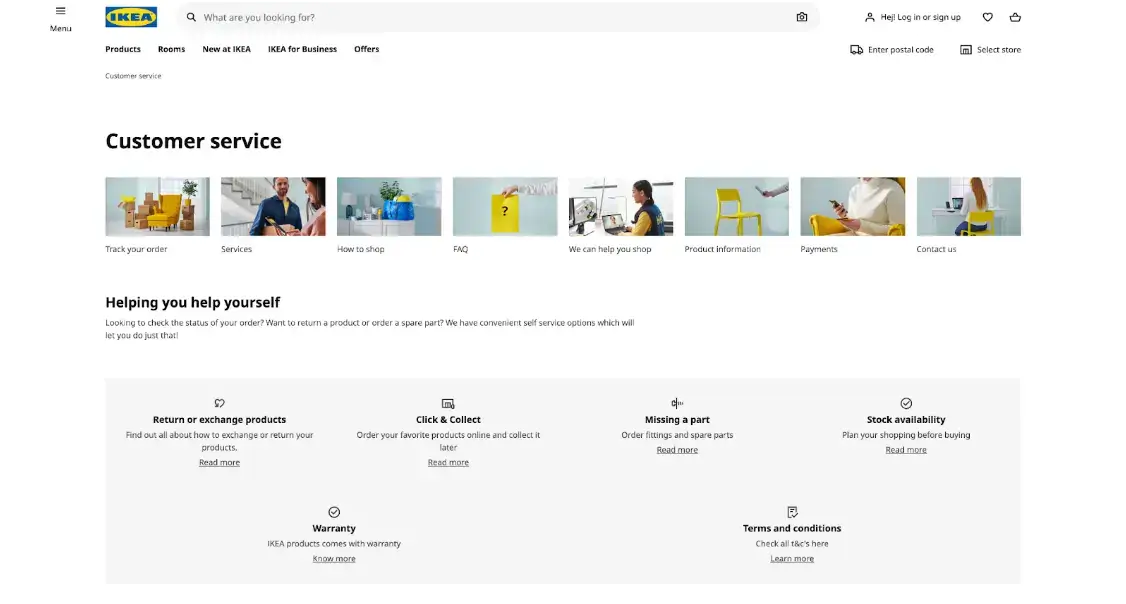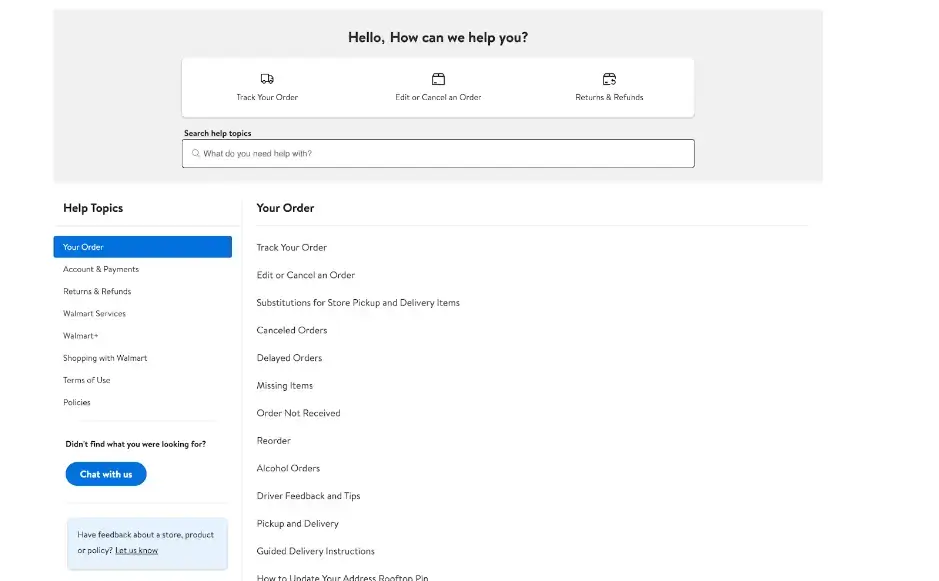Have you ever wondered how drastically the way we shop for goods has transformed in just the last two decades?
Not long ago, we would venture out to physical stores, meticulously select our purchases, and brave long checkout lines.
Today, you can effortlessly shop from the comfort of your couch, selecting items from virtually anywhere in the world.
This remarkable shift in consumer behavior owes much of its convenience and efficiency to the ever-evolving realm of eCommerce.
In this article:
- What is an eCommerce Knowledge Base?
- Why Does Your eCommerce Site Need a Knowledge Base?
- Building an Effective eCommerce Knowledge Base
- Best Knowledge Base Examples in eCommerce
- Tools to Build Your Own eCommerce Knowledge Base

Image Credit - FreePik
In the past two decades, eCommerce has surged in popularity, forever altering the retail landscape.
According to recent statistics by Forbes, the eCommerce industry has grown astonishingly, with the market expected to total over $8.1 trillion by 2026.
While the convenience of online ordering, easy exchanges, and hassle-free refunds are integral to what makes eCommerce platforms excel, another critical aspect that sets them apart is the proactive information they provide to customers.
eCommerce platforms don't merely facilitate transactions; they empower their existing, new, and prospective customers with knowledge and support.
In a digital world where information is king, one of the most effective ways these platforms achieve this is through a self-help knowledge base.
This blog explores why a knowledge base is an indispensable tool for eCommerce websites and how it elevates the online shopping experience for all.
So, let's delve into the world of eCommerce knowledge bases and discover the transformative impact they can have on your online shopping journey.
What is an eCommerce Knowledge Base?
An eCommerce knowledge base serves as a central hub of valuable information and resources for customers.
It is a readily accessible library, housing a vast spectrum of content to guide customers through their shopping journey, resolve common queries, and ensure a seamless user experience.
This digital resource provides a wealth of organized, structured information, making it easy for users to locate the content they seek through its search functionality.
It boasts an array of content, including visual guides with images, video knowledge bases, and FAQs.
The best part is that it's available 24/7, serving as a knowledgeable store assistant, enriching the customer's shopping experience.
Why Does Your eCommerce Site Need a Knowledge Base?
As the eCommerce landscape continues to evolve at an unprecedented pace, providing adequate customer support has become both the bedrock and the potential battleground for businesses in this digital realm.

Image Credit - FreePik
- Challenge 1: Diverse Range of Customer Queries and Issues
- Challenge 2: 24/7 Customer Expectations
- Challenge 3: Handling Customer Queries
- Challenge 4: Scalability and Volume
- Challenge 5: Consistency and Accuracy
This section will delve into the hurdles eCommerce websites encounter and how a knowledge base can effectively address them, providing practical solutions to help them thrive.
Challenge 1: Diverse Range of Customer Queries and Issues
One of the biggest challenges for eCommerce websites is handling a wide range of customer questions and issues.
These can be about products, shipping, returns, and refunds, and they come in many different forms.
This challenge is significant because it requires the ability to respond effectively to all these different inquiries.
Successfully addressing these questions is crucial to delivering a good customer experience and building trust, both of which are essential for eCommerce success.
Knowledge Base Solution: Empowering Customers with Information
A knowledge base acts as a comprehensive information repository. Here's how it effectively addresses this challenge:
- One-stop information hub: The knowledge base serves as a centralized hub for customer queries, providing answers to frequently asked questions, detailed product guides, and clear explanations of policies.
- Round-the-clock accessibility: Customers have 24/7 access to this valuable resource. It empowers them to independently seek information whenever they have questions, aligning perfectly with their expectations for instant assistance.
- Empowering self-service: The knowledge base's self-service aspect empowers customers to find solutions independently. This enhances their experience and significantly reduces the burden of repetitive inquiries on customer support teams.
Challenge 2: 24/7 Customer Expectations
Customers expect swift, accurate, round-the-clock support in the digital era.
Meeting these expectations efficiently can be a logistical puzzle, especially for businesses reliant on human-driven support.
Knowledge Base Solution: Aligning with 24/7 Customer Needs
To address this challenge effectively, a well-structured knowledge base seamlessly caters to the 24/7 customer mindset.
It accomplishes this by offering readily accessible resources that customers can tap into. Here's how it works:
- Uninterrupted accessibility: The knowledge base is designed to be available around the clock, mirroring the always-on nature of the digital world. This accessibility empowers customers to find answers whenever needed, even during unconventional business hours. Consider enhancing user engagement further by exploring innovative solutions like AI subtitling companies, ensuring that your content is not only accessible but also inclusive for diverse audiences.
- Enhanced customer experience: With the knowledge base readily accessible, customers can access instant information at their fingertips. This aligns with their 24/7 expectations and significantly enriches their overall experience.
Additionally, tools like WowTo help businesses create multilingual video knowledge bases without difficulty, catering to users across different geographic boundaries.
Challenge 3: Handling Customer Queries
eCommerce websites often face the challenge of handling a high volume of customer inquiries that overwhelm human support teams.
These inquiries range from simple questions to complex issues, and addressing them efficiently can be daunting.
This challenge places significant strain on support teams and can impact the quality of service provided.
Knowledge Base Solution: Reducing Support Burden
A knowledge base comes to the rescue by offering a solution that helps alleviate this challenge.
This continuous accessibility minimizes the strain on human support teams.
Customers can find answers independently, lightening the support workload and allowing teams to focus on more complex inquiries, thereby elevating the quality of service provided.
Challenge 4: Scalability and Volume
eCommerce businesses frequently experience fluctuations in customer inquiries, particularly during peak periods such as holiday sales or promotional events.
Knowledge Base Solution: Effortless Expansion
In addressing the challenge of Scalability and Volume, knowledge bases offer a distinct advantage: seamless scalability with business growth.
They can accommodate increased customer inquiries without requiring a proportional boost in staffing.
This scalability guarantees efficient customer support even during peak inquiry periods.
It reduces response times and minimizes customer frustration, ensuring a smoother, more satisfying customer experience, regardless of inquiry volume.
Challenge 5: Consistency and Accuracy
Trust is paramount in eCommerce and hinges heavily on the consistency and accuracy of information provided.
Inconsistencies or errors in product details, pricing, or policies can swiftly erode customer confidence.
Knowledge Base Solution: Reliability Through Consistency
A meticulously maintained knowledge base ensures consistent, accurate dissemination of information.
It serves as a single source of truth, ensuring uniformity in customer interactions.
This uniformity builds trust and mitigates the risk of misinformation, fostering a reliable, trustworthy shopping environment.

Building an Effective eCommerce Knowledge Base
- Multimedia Integration: Visual Guides for Enhanced Understanding
- Search Functionality: A Shopper's Shortcut
- Organized Product Information: Simplifying the Shopping Experience
- Integration with eCommerce Support Tools: A Unified Shopping Experience
- Regular Updates and Maintenance: Keeping the Content Updated
Now that we've explored the importance of a knowledge base, it's crucial to understand the key features to consider when setting one up for your eCommerce website.

Image Credit - FreePik
Multimedia Integration: Visual Guides for Enhanced Understanding
Integrating videos into your knowledge base can provide visual guides and tutorials, offering an alternative, more engaging way to convey information.
These videos can cover product demonstrations, assembly instructions, troubleshooting tips, and more.
Why It Matters: Videos engage visual and auditory senses, making it easier for customers to grasp complex concepts and instructions.
They offer a dynamic and interactive learning experience that can enhance customer understanding.
Visual content can be especially effective for showcasing product features and benefits, positively influencing purchasing decisions.
Search Functionality: A Shopper's Shortcut
Search functionality is your customers' shortcut to quickly locating the information they need.
It enables online shoppers to find product details, order information, and policy details effortlessly.
A practical search feature provides accurate results and suggests related articles, guiding customers seamlessly through their inquiries.
Why It Matters: This feature significantly enhances the online shopping experience by enabling customers to quickly find answers to questions about product specifics, shipping details, or return policies.
Moreover, efficient search functionality reduces the number of repetitive inquiries, lightening the workload on your customer support teams.
Organized Product Information: Simplifying the Shopping Experience
Efficient categorization and organization of product information resembles a well-arranged store, offering clear product categories, subcategories, and product keywords to guide customers through your offerings.
Why It Matters: Well-organized product information simplifies the online shopping experience by making it easy for customers to browse product categories, explore related items, and access detailed specifications.
Additionally, for your support teams, organized content simplifies updating product listings and ensures product information remains accurate and up-to-date.
Integration with eCommerce Support Tools: A Unified Shopping Experience
Integrating eCommerce support tools like live chat, email, or order tracking systems creates a unified shopping experience. It allows customers to transition from self-service assistance to personalized support when needed, seamlessly.
Why It Matters: Integration enhances the online shopping experience by allowing customers to switch between self-help resources and direct assistance.
This versatility reduces frustration and ensures that customers receive tailored support. Integration simplifies tracking and managing customer interactions for your support teams, including orders and returns.
Regular Updates and Maintenance: Keeping the Content Updated
Just as any well-run business requires regular updates and maintenance, your knowledge base must be kept current.
This involves focusing on product information, including revising product descriptions, retiring outdated listings, and adding new product details as necessary.
Why It Matters: Regular updates and maintenance ensure that customers can rely on the knowledge base for accurate and current product information.
It also minimizes the risk of customers encountering outdated or incorrect product details, which can lead to dissatisfaction and potentially lost sales.
Best Knowledge Base Examples in eCommerce
- IKEA
- eBay
- Walmart
- Etsy
Some of the leaders in global eCommerce have not only revolutionized the way we shop online, but have set the standard for what an exceptional eCommerce knowledge base should look like.
1. IKEA
IKEA's knowledge base is a prime example of helping customers help themselves.
When you visit IKEA's knowledge base, you'll find a clean, easy-to-use interface with a wide range of options for your convenience.
Whether you want to learn the basics of shopping at IKEA, track your orders, or get answers to any IKEA-related questions, their knowledge base sets a high standard. It's accessible and user-friendly, making it a winner.

2. eBay
eBay, the international eCommerce platform, is widely recognized for its diverse product offerings and its commitment to providing valuable knowledge to its user base, encompassing both buyers and sellers.
eBay's knowledge base features an intuitive user interface with a clean, organized layout covering a wide range of topics, thoughtfully categorized into sections.
Prominently placed at the top is a search bar that facilitates easy information retrieval.
After each article, users are invited to share feedback on the content's helpfulness, helping eBay continuously enhance its offerings.
Furthermore, eBay's knowledge base includes an interactive 'Ask the Community' feature.
This functionality unites users, including buyers and sellers, on a shared platform, enabling them to connect and collaborate to address their queries.
It reinforces eBay's commitment to nurturing a sense of community and mutual support among its user community.

3. Walmart
Another excellent example is Walmart, which provides a well-structured knowledge base.
Walmart categorizes its information clearly, with each category further subdivided into multiple subcategories.
This organization makes it incredibly convenient for users to find the answers they need.
Walmart's knowledge base is comprehensive and user-centric, ensuring customers have easy access to support when required.

4. Etsy
Etsy, a prominent platform celebrated for its exclusive focus on handmade, vintage items and craft supplies, offers a knowledge base that mirrors the uniqueness of its eCommerce concept.
It seamlessly blends essential elements to help users find solutions to their queries effortlessly.
Notably, Etsy's knowledge base features a prominent search bar at the forefront, ensuring swift access to information.
Its clear demarcation into sections catering to buyers and sellers sets it apart.

Etsy's knowledge base excels with its dual Call-to-Action (CTA) buttons, thoughtfully placed for quick access to order-related support. However, Etsy's distinctive edge lies in the 'Etsy Journal.'
This exceptional resource serves as a hub for inspiration, providing a treasure trove of creative ideas and insights for those embracing a lifestyle steeped in creativity and innovation.
This unique facet adds an extra layer of depth to Etsy's knowledge-sharing platform.
Tools to Build Your Own eCommerce Knowledge Base
- WowTo
- SubPage
- Gorgias
- Liveagent
Now that we've explored the advantages, challenges, and real-world examples, we must implement our knowledge.
This section will delve into practical tools for building different knowledge bases, each offering unique advantages.
Let's look at these tools; you can decide based on your preferences.
1. WowTo
WowTo stands out as a unique platform renowned for crafting video-based knowledge bases.
Its user-friendly video creator streamlines the process of creating engaging product videos, using the product's visuals.

The tool also lets you incorporate AI voices into your videos, eliminating the need for manual voice recording.
If you aim to build a knowledge base centered around video content, WowTo is an excellent choice.
2. SubPage
SubPage is perfect for constructing various help pages, including Help Centers, FAQs, and Glossaries, tailored to your eCommerce platform.
SubPage simplifies the creation of these pages without coding, allowing you to maintain brand consistency by adhering to your brand's style guide through its customization feature.

With SubPage, you can effortlessly build a Help Center with multiple categories, each further organized into subcategories.
Additionally, it includes a useful Google Chrome Extension for creating detailed guides automatically, step by step.
3. Gorgias
Gorgias, designed for eCommerce, is the go-to tool for streamlining the customer journey and creating a help desk.
It offers omnichannel support, chatbots, Macros, and Rules and provides insights into support performance and revenue statistics, making it an essential asset for online stores.

4. Liveagent
LiveAgent presents a user-friendly option for effortlessly establishing your eCommerce knowledge base.
It simplifies the process, empowering both agents and customers with essential resources for seamless interactions.

LiveAgent also stands out for its flexibility and ease of use. It allows businesses to create and manage a structured knowledge base alongside live chat, ticketing, and call center features, all from a single dashboard.
For eCommerce teams, this means faster onboarding for support agents and a smoother customer experience.
Articles can be created, updated, and organized quickly, ensuring shoppers always have access to accurate and helpful information.
By combining real-time support with self-service resources, LiveAgent helps eCommerce businesses strike the right balance between automation and human assistance.
Empowering Your eCommerce Future
A well-designed knowledge base is no longer optional—it’s essential.
By empowering customers with instant, accurate information, you reduce friction, build trust, and scale support efficiently.
In a competitive eCommerce landscape, a knowledge base isn’t just a support tool—it’s a growth engine that improves customer experience and drives long-term success.



